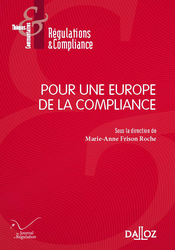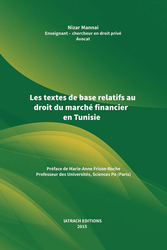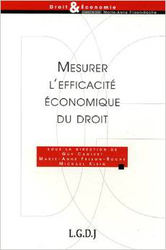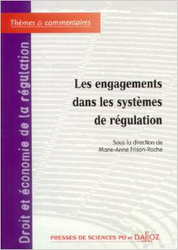May 29, 2019
Publications

► Full Reference: M.-A. Frison-Roche, "Avant-propos" ("Foreword"), in M.-A. Frison-Roche (ed.), Pour une Europe de la Compliance (For the Europe of Compliance), series "Régulations & Compliance", 2019.
____
📕read a general presentation of the book, Pour une Europe de la Compliance, in which this foreword is published.
____
► The Foreword: It is sometimes said the construction of Europe is blocked, or even is in decline. But this construction can only advance because it is not only community to be rediscovered by the effect of a common culture or the result of an agreement between States or the benefit of commercial exchanges: it is also a legal Order. And Law is moving forward, sometimes like a goat through rulings of lightning justice, sometimes through legislation whose development have certainly the step of the turtle but also the strength of this military figure.
For this, any legal mechanism is good to take, so foreign, even aggressive, it may seem at first. Compliance, on which everyone questions the definition, in which we sometimes see the enemy to fight, about which we often doubt that it is really a legal mechanism, could well be useful.
So, let's seize the opportunity. It is not so common that a branch of law appears. The framework is still young, it is appropriate to take advantage of what is sometimes presented as defects, for example the uncertainty of definitions, but which are only defects of youth, or what is perceived as archaisms, in particular the violence of the compliance mechanisms, in their scale, their procedure and their territorial scope. But isn't a means of reconstituting the regalian at the moment when the states are struggling to recover from a report given to the cause to the territory ? Allowing them to pursue goals in the pretension that they must be satisfied (for example the fight against corruption or the sale of human beings)? Compliance Law allows the states to claim again and with a stronger voice their prerogatives.
Moreover, let us take advantage of this still malleable idea of the Compliance Law to obtain that Europe imbues the compliance mechanism with its legal Order. Compliance Law is undoubtedly the Law of tomorrow, the law without frontiers by which the legitimate public authorities set the Law, by fixing Ex ante goals and internalizing them in the crucial operators who carry them out in ways they build, public supervisors continuously monitoring the results achieved the goals set by the authorities. The Compliance Law allows that the powerful worldwird companies are not our masters because is the master who sets the goals and not the one who reaches them.
This is where Europe brings to the Compliance Law, where Europe can be exemplary of the Law of tomorrow. Indeed, where long-established systems, as American Law did, have developed Cmpliance techniques to prevent systemic risks, Europe can put back to the center its primary concern: the Person, a notion that Europe invented in order to protect by rights and obligations human beings against the only game of powers.
A Europe strengthened by Compliance Law; a Compliance Law transfigured by the European tradition: how not to be For a Europe of Compliance?
This is what the authors of this book demonstrate to us.
________
May 28, 2015
Publications

Référence complète : Frison-Roche, M.-A., La codification du droit financier et son bon usage, Préface de Mannai, Nizar, Les textes de base relatifs au droit du marché financier en Tunisie, Latrach Éditions, 2015, 5-12.
Lire la préface.
Lire le working paper qui a servi de support à la rédaction de la préface.
Jan. 27, 2007
Publications

Référence complète : Canivet, G. et Frison-Roche, M.-A., Avant-propos de Canivet, G., Klein, M. et Frison-Roche, M.-A. (dir.), Mesurer l'efficacité économique du droit, coll "Droit et Économie, LGDJ, 2005, p. VII-XIII.
Lire une présentation de l'ouvrage.
Lire la présentation de l'article de Marie-Anne Frison-Roche.
Jan. 27, 2006
Publications

Référence complète : Frison-Roche, M-A., Article introductif de Les engagements dans les systèmes de régulation, série "Droit et Économie de la Régulation", Dalloz-Presses de Sciences po, 2006.
Les engagements sont une notions-clé en droit et en économie, mais les regards sont rarement croisés. Ainsi, les juristes manient depuis toujours la notion de contrat, tandis que les économistes n’intègrent guère la dimension juridique de l’engagement. La première partie de l’ouvrage reprend plutôt les catégories économiques, en s’appuyant sur l’opposition "ex ante/ex post", l’engagement étant du côté du premier, ce qui caractériserait la régulation par rapport à la garde de la concurrence. Les expériences montrent que si d’origine l’ex ante est conçu pour laisser place à l’ex post, on connaît des glissements de l’ex post vers l’ex ante.
Jan. 6, 2005
Publications
Sept. 8, 2004
Publications
March 9, 2004
Publications
Sept. 8, 2001
Publications

► Référence complète : Frison-Roche, M-A, « Préface », in Payet, M.-S., Droit de la concurrence et droit de la consommation, coll." Nouvelle bibliothèque de thèses", Dalloz, 2001, pp.VII-IX.
____
📝Lire la présentation de l'ouvrage, pour lequel la préface est faite.
____